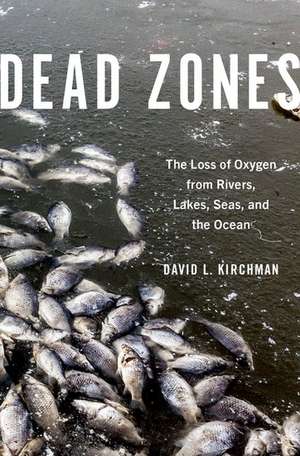Dead Zones: The Loss of Oxygen from Rivers, Lakes, Seas, and the Ocean
Autor David L. Kirchmanen Limba Engleză Hardback – 8 apr 2021
Preț: 251.18 lei
Nou
Puncte Express: 377
Preț estimativ în valută:
48.08€ • 50.51$ • 40.41£
48.08€ • 50.51$ • 40.41£
Carte disponibilă
Livrare economică 07-13 februarie
Preluare comenzi: 021 569.72.76
Specificații
ISBN-13: 9780197520376
ISBN-10: 0197520375
Pagini: 228
Dimensiuni: 236 x 155 x 20 mm
Greutate: 0.48 kg
Editura: Oxford University Press
Colecția OUP USA
Locul publicării:New York, United States
ISBN-10: 0197520375
Pagini: 228
Dimensiuni: 236 x 155 x 20 mm
Greutate: 0.48 kg
Editura: Oxford University Press
Colecția OUP USA
Locul publicării:New York, United States
Recenzii
This book weaves a great story about the most insidious form of aquatic pollution, encompassing greed, denial, and stupidity on the one hand, and human ingenuity and the triumph of science on the other. This mixture makes for great reading -- a true detective yarn if you will ... I highly recommend this book to everyone -- ecologists, teachers, monitoring experts, fishers, conservation organizations, policymakers -- in my opinion its even qualifies as a summer beach read for the broader public. A bookshelf must!
Kirchman's conversational tone makes Dead Zones nicely accessible . . . At only 172 pages, this book is not a thorough overview but more a general introduction. Since these topics are normally discussed in scientific journals, reports, academic monographs, and edited collections, it is an introduction that is long overdue.
COVID-19 has shown us how important but uneasy our relationship with nature can be. In this book, David Kirchman reminds us not only that this isn't new but also of the importance of getting this relationship right. As you read the book, you wonder at what point we will realize that it is clearly in our own self-interest to live more harmoniously with nature than we do right now. This book is a great reminder of this and what can happen when it all goes wrong. Dead Zones explains how and why it is in our collective interest to act now and change things for the better.
Dead Zones is a stomping good read detailing the waxing and waning of low oxygen waters. Particularly appealing are the intriguing insights Kirchman gives of the scientists who discovered these zones and the twists and turns of their endeavors. The latter chapters are sobering as the link between our burning of fossil fuels, ocean warming, and the growing loss of oxygen across and through the great depths of the ocean becomes clear. There is a finale of optimism with suggestions of what we can all do if we want a thriving and productive ocean — which, after all, is our life support system.
Fertilizer madness, killer plankton blooms, hypoxia, anoxia, mass mortalities, and mayhem: This book tackles the only form of pollution — eutrophication — that is killing off entire coastal zones and beyond. It maps out the human-induced causes, introduces the major players involved in unraveling this long-unfolding detective story, and compellingly argues for why we should care and what might be done on this key environmental battlefront. A bookshelf must!
Kirchman's conversational tone makes Dead Zones nicely accessible . . . At only 172 pages, this book is not a thorough overview but more a general introduction. Since these topics are normally discussed in scientific journals, reports, academic monographs, and edited collections, it is an introduction that is long overdue.
COVID-19 has shown us how important but uneasy our relationship with nature can be. In this book, David Kirchman reminds us not only that this isn't new but also of the importance of getting this relationship right. As you read the book, you wonder at what point we will realize that it is clearly in our own self-interest to live more harmoniously with nature than we do right now. This book is a great reminder of this and what can happen when it all goes wrong. Dead Zones explains how and why it is in our collective interest to act now and change things for the better.
Dead Zones is a stomping good read detailing the waxing and waning of low oxygen waters. Particularly appealing are the intriguing insights Kirchman gives of the scientists who discovered these zones and the twists and turns of their endeavors. The latter chapters are sobering as the link between our burning of fossil fuels, ocean warming, and the growing loss of oxygen across and through the great depths of the ocean becomes clear. There is a finale of optimism with suggestions of what we can all do if we want a thriving and productive ocean — which, after all, is our life support system.
Fertilizer madness, killer plankton blooms, hypoxia, anoxia, mass mortalities, and mayhem: This book tackles the only form of pollution — eutrophication — that is killing off entire coastal zones and beyond. It maps out the human-induced causes, introduces the major players involved in unraveling this long-unfolding detective story, and compellingly argues for why we should care and what might be done on this key environmental battlefront. A bookshelf must!
Notă biografică
David L. Kirchman was Maxwell P. and Mildred H. Harrington Professor of Marine Studies at the University of Delaware before his retirement in 2020. He holds a BA in biology from Lawrence University, an MS in environmental engineering from Harvard University, and a PhD in environmental engineering — with a focus on microbiology — also from Harvard University. He is a recipient of the Francis Alison Award and a fellow of the American Society for Microbiology and the Association for the Sciences of Limnology and Oceanography. He is the editor of Microbial Ecology of the Oceans and the author of Processes in Microbial Ecology.
